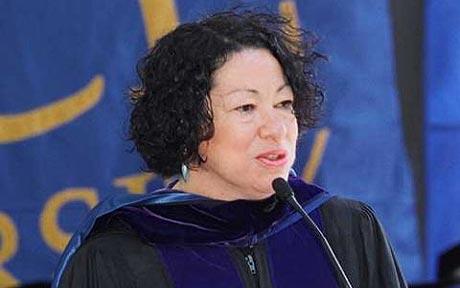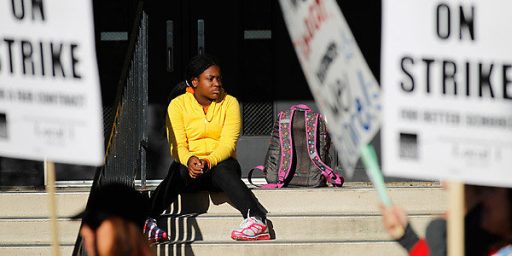Sotomayor: Overturn Corporate Personhood
 It appears that Sonia Sotomayor will be an activist judge after all.
It appears that Sonia Sotomayor will be an activist judge after all.
During arguments in a campaign-finance case, the court’s majority conservatives seemed persuaded that corporations have broad First Amendment rights and that recent precedents upholding limits on corporate political spending should be overruled. But Justice Sotomayor suggested the majority might have it all wrong — and that instead the court should reconsider the 19th century rulings that first afforded corporations the same rights flesh-and-blood people have. Judges “created corporations as persons, gave birth to corporations as persons,” she said. “There could be an argument made that that was the court’s error to start with…[imbuing] a creature of state law with human characteristics.”
[…]
“Progressives who think that corporations already have an unduly large influence on policy in the United States have to feel reassured that this was one of [her] first questions,” said Douglas Kendall, president of the liberal Constitutional Accountability Center. “I don’t want to draw too much from one comment,” says Todd Gaziano, director of the Center for Legal and Judicial Studies at the conservative Heritage Foundation. But it “doesn’t give me a lot of confidence that she respects the corporate form and the type of rights that it should be afforded.”
For centuries, corporations have been considered beings apart from their human owners, yet sharing with them some attributes, such as the right to make contracts and own property. Originally, corporations were a relatively rare form of organization. The government granted charters to corporations, delineating their specific functions. Their powers were presumed limited to those their charter spelled out. “A corporation is an artificial being, invisible, intangible,” Chief Justice John Marshall wrote in an 1819 case. “It possesses only those properties which the charter of its creation confers upon it.”
But as the Industrial Revolution took hold, corporations proliferated and views of their functions began to evolve. In an 1886 tax dispute between the Southern Pacific Railroad and the state of California, the court reporter quoted Chief Justice Morrison Waite telling attorneys to skip arguments over whether the 14th Amendment’s equal-protection clause applied to corporations, because “we are all of opinion that it does.”
[…]
Subsequent opinions expanded corporate rights. In 1928, the court struck down a Pennsylvania tax on transportation corporations because individual taxicab drivers were exempt. Corporations get “the same protection of equal laws that natural persons” have, Justice Pierce Butler wrote.
From the mid-20th century, though, the court has vacillated on how far corporate rights extend. In a 1973 case before a more liberal court, Justice William O. Douglas rejected the Butler opinion as “a relic” that overstepped “the narrow confines of judicial review” by second-guessing the legislature’s decision to tax corporations differently than individuals. Today, it’s “just complete confusion” over which rights corporations can claim, says Prof. William Simon of Columbia Law School.
Rather clearly, the Court will not have 5 votes to overturn nearly two centuries of precedent. By contrast, the conservatives on the Court may well have the votes to overturn decades of precedent in campaign finance law, finally deciding that the 1st Amendment fully applies to corporations and that money is speech.
Both of these directions are arguably activist; they’re certainly a violation of the stare decisis tradition. But corporate personhood is a bedrock principle of American corporate law; the only question is how far it extends. While being gradually limited in scope in recent years, the premise has never been seriously questioned by the Supreme Court. Campaign finance law, conversely, has always been a balancing test, with the Court both recognizing that donating to candidates and political advertising have qualities of speech and yet deferring to the public policy interest in reigning in the appearance of undue influence.






I think that “overturn” would have been a better choice of words than “repeal” in the title. [Good point. Changed. – jhj] To the best of my knowledge the personhood of corporations has never been enacted into law here and it’s a good example of judge-made law.
I think that whether this is an instance of a predisposition towards judicial activism on Justice Sotomayor’s part or not is a somewhat more complex question than you’re implying, James. My hipshot reaction is that there’s a distinction between intervening to overturn judge-made law and creating new judge-made law.
Corporate personhood was, in computer lingo, a convenient hack.
They weren’t really people, but treating them as such allowed us to use a whole established system of law, created for people.
Getting rid of the hack would require that some other whole new system be created – way too much work for the judicial and legislative branches.
So we’re probably stuck, with perhaps subtle changes to distinguish corporate persons from corporeal ones.
That’s right, but it’s not really clear what this personhood is and what rights should accrue to it (as was intimated by Prof. Simon). I think it might be useful to investigate the corporation as person argument. If a corporation is a person, it surely is a strange kind of person and not a person like you and me:
1) can a corporation get diabetes?
2) can a corporation convert to Christianity?
3) can a corporation improve its golf swing?
4) can a corporation learn to drive?
5) can a corporation develop a fondness for green tea?
6) can a corporation stand on a scale?
7) can a corporation forget the meaning of a word?
8) can a corporation doubt its own existence?
9) can a corporation get an MRI?
10) can a corporation get pregnant?
and so on.
Now the proper answer to those questions is not “No”. The proper answer is, “The questions don’t make any sense because a corporation is not the kind of thing for which those questions are appropriate.” That is, a corporation is not a human person. Now some suggest that we ought to treat corporations as the people who make them up. Each of those people has rights, the argument goes, so the corporations must have those rights too. That’s the fallacy of composition. It’s as if I were to argue that since all even numbers are (assuming Goldbach) the sum of two prime numbers, the class of even numbers is itself the sum of two prime numbers. We cannot, in general, impute to an aggregate what is true of the members of the aggregate (and vice versa). That we often use aggregate language to talk about the individual members of the aggregate is not evidence that the aggregate has any of the characteristics of the members (“The [NFL team of your choice] suck.”) All this has a kind of Platonistic air, but I’m not arguing that these aggregates have a being above and beyond that of their members, only that their place in our conceptual scheme differs from that of the members, differs in a logically fundamental way.
So, yes, the personhood of a corporation is a legal construct, fiction, however you wish to characterize it. The question is, “Does this construct serve a useful or deleterious purpose?”
That’s to say, the question of corporate rights is prudential and not, I would argue, one of fundamental constitutional bestowal.
[This is cross-posted and edited from something I posted at Volokh under my other nom-de-blog–just to be upfront]
Wonder if she would apply the same standard to labor unions? If I pay union dues and the union voices political opinions I disagree with and uses my dues to fund policies or politicians I do not support. Are my civil rights being abused? I am being forced to contribute to that with which I disagree. Corporations are owned by stockholders who vote. Just like unions.
Anyone here, libertarian or conservative, ever said that corporations should not be charged income tax “because they are not people?”
If so, maybe you should sign on with Sotomayor.
This ties in with Sam’s list of course. People have a natural lifespan. They can acquire wealth and power, but it must ultimately dissipate. Or, usually dissipate. There are few successful dynasties.
Joe Kennedy ain’t no more.
Breathe deeply, JJ. The issue, as noted above, is what degree of “personal” rights a corporation is entitled to receive.
Also, “judicial activism” is normally understood to mean overturning acts of Congress as “unconstitutional” on a dubious basis.
Here, it’s the pro-corporate interests who want an act of Congress repealed on the alleged grounds that corporate speech cannot be regulated any more than yours or mine.
I think those grounds would have startled Jefferson and Madison, quite frankly.
It’s worth noting that at the time of the adoption of the Constitution, corporations were forbidden from undertaking activities that were outside the scope of their charters and forbidden from acquiring or using property for any reason not within the scope of their purpose outlined in those charters.
For people typing their comments on their corporate bosses’ computers, do you have First Amendment rights associated with that activity or is the corporate world a rights-free zone?
Can the government search the desk and office of the corporate employee without a search warrant?
I think there is an analogy here to be drawn with the extension of constitution rights to non-residents of the United States. If these people/ corporations become rights-free zones, natural citizens will have their freedoms limited as well.
Some of the American colonies were essentially public corporations, but what we now call corporations (private general corporations of limitless duration) did not exist until after the Civil War.
PD,
I think that those are worthy questions and worth due consideration, too. It’s a tricky subject, especially because the economy today is so (unfortunately) corporation-dependent.
I’m pretty sure they still are, only the charters now say things like “the corporation is organized to day any lawful thing” and so the limits are effectively repealed.
Of course, there won’t be any unintended consequences for any hasty progressive actions.
Alex, your (unfortunately) kind of gives the game away, doesn’t it?
Charles,
It does–I prefer real free-markets, which would allow for dynamic business creation and entrepeurialism over the staid, corporatist UN-free market that we have today, where both government and private institutions are geared towards the perpetuation of large, unwiedly companies and their protection against smaller, more nimble competitors.
@PD
I believe the answers are No and Yes. The corporation is well within its rights as employer to restrict the use of its computers to strictly business use as it sees fit to define such use. So it could determine that posting to OTB is not a legitimate use of its computer resources, and you would not have a First Amendment claim.
Joyner, you misunderstood Justice Sotomayor’s question. As Anderson pointed out, the question here is not whether corporations are legal persons, but whether they are persons for the purposes of the Privileges and Immunities clause. Once you grant corporate personhood, then by necessity you must grant some constitutional rights (such as some measure of due process). But judges of all political persuasions agree that corporations do not have constitutional rights co-extensive with that of natural persons. For example, corporate records of a customer’s transactions may be obtained with a subpoena rather than a search warrant (which is why the Orwellian-sounding National Security Letters have not been ruled unconstitutional).
The way I see it, there are three sets of interests: The state’s, the shareholders’ and the public’s. Corporations are creatures of state (and sometimes federal) law and states could abolish their corporation laws tomorrow without presenting any constitutional problems. (There is a takings issue with regard to abolition of existing corporations, but in any case, no one can deny that states can abolish corporations prospectively.) If states can exercise what is effectively a death penalty on corporate persons without any legal process at all, then even more clearly they can limit their powers and rights, including their constitutional rights.
From the shareholders’ perspective, a corporation is just another thing that they own. Usually, we don’t restrict people from using a thing to exercise their legal rights on the basis of saying the thing they are using has no rights of its own. If we jointly pooled our money to buy a printing press and hire someone to print a newspaper, without bothering to form a corporation, then collectively we’d be able to assert our free speech rights with regard to the operation of that press. In that case, it would be absurd to say we were arguing that the machine itself has the right of free speech. So why should it be different if we incorporate?
The answer seems to be that the state grants certain benefits – tax, ease of contract formation, potential perpetual life, and limited liability for the shareholders – when it authorizes the creation of a corporation. In exchange, the shareholders who are natural persons give up the right to use the capital invested in that entity in certain ways. If they wish to use it for expressive activity, they can withdraw the money from the corporation first and then buy their own soapbox.
From the public’s standpoint, there are competing interests which spring from that fact that corporations are integral to modern life, both economically and socially. On one hand, a significant chunk of our economy’s assets are tied up in corporations, so by saying such entities have limited free speech rights deprives the marketplace of ideas of a significant amount of capital (no pun intended). Also, corporations being so significant economically means that their management has information and viewpoints that would be valuable to the average person. Also, corporations have become explicit vehicles for advocating viewpoints; as examples, the National Rifle Association or the ACLU. Since the court has ruled that the Free Speech clause vindicates the rights of the hearer as well as the speaker, then there is a good argument that corporate free speech should be constitutionally protected for the benefit of individuals who are not shareholders.
On the other hand, the public has a justifiable fear that the amount of capital in corporate hands distorts the marketplace of ideas, too. Because of their perpetual life and the difference between the incentives and concerns of a natural person (which underlies the free speech clause) and those of a collective entity, the worry is that corporations already dominate modern media and that giving them free speech rights equal to those of people would mean more dilution of the voices of ordinary people in things like political campaigns.
So, it’s a tough issue, and it’s not a question of whether corporations have legal personhood. They do. The question is what rights the government must grant to such artificial entities once the government decides to allow them to exist.
The privileges and/or immunities clauses only apply to citizens, and corporations aren’t eligible to be citizens.
The Constitution says “Congress shall make no law . . . abridging the freedom of speech.” Personhood/citizenship are irrelevant. It shouldn’t make any difference to say Congress is only abridging the freedom of CNN or HarperCollins. (And doesn’t preventing an author from publishing or selling a book during the black out period infringe his individual rights, even though he’s relying on the corporate expenditures of a publishing house and book distributors and stores?)
“1) can a corporation get diabetes?
2) can a corporation convert to Christianity?
3) can a corporation improve its golf swing?
4) can a corporation learn to drive?
5) can a corporation develop a fondness for green tea?
6) can a corporation stand on a scale?
7) can a corporation forget the meaning of a word?
8) can a corporation doubt its own existence?
9) can a corporation get an MRI?
10) can a corporation get pregnant?
and so on.”
“”””””””””””””””””””””””””””””””””””””””””””””””””
Jane Doe could do none of these,
“She” was granted person status.
She did not even exist.
What are you on about, ffloyd?
Alex, free markets and corporations are not opposites — but you know that. The only problem with “big” corporations today is the influence they can exert on government to obtain favors and put up barriers to competition. I view that as much less of a problem with corporations than with government, though your mileage may vary.
There are economies of scale that really do matter for many large corporations. But if those companies become inefficient through their bureaucracies or complacency, then smaller, quicker, more efficient competitors will displace them in a free market. Unless, of course, their friends in government stifle that process.
This is an argument for smaller government, not smaller companies.
@PD
That’s an interesting observation, PD. The 14th says:
One could argue that that states that a necessary condition for personhood is that one be born. And I’m pretty sure the framers of the 14th understood ‘born’ as ‘issue from a mother’. (It doesn’t state a sufficient condition because, unfortunately, there are stillborn children…) I could have added that to my list. To your point, it also states that a necessary condition for citizenship is that one be a person (and, if I’m right, in accordance with the previously stated necessary condition on personhood.)
Uh, so how does no taxation without representation fit into corporate personhood?
I apologize if this has been brought up elsewhere, but in order to seek redress in the courts one must have standing to do so. In lieu of personhood, how would corporations satisfy locus standi?
@Charles
Well, that’s easily addressed by noting, as folks have said above, that we grant corporations a measure of the rights accorded to human persons. The nub of the question is just what set of rights ought we to accord them and on what grounds?
I don’t see how the court (or government in general) can much longer defend the premise that a corporation is a person; for reasons similar to those observed in Cato’s Letter No. 92: “It has been justly observed of corporations, or political combinations of men, that they have bodies, but no souls, nor consequently consciences.”
However; corporations are composed of real people who should be able to spend their corporations funds just as any other group of persons.
D.T.
Someone should remind Justice Sotomayor that although the concessionary principle is no longer considered good law, the principles that led up to it are alive and well and ruthlessly enforced by the IRS.
The original function of the proto-Corporation was to extend the taxing authority of the King to people he didn’t rule — he couldn’t tax Russian peasants, but the Company of Friends could sell them stuff, and the King could tax the Company or its members, or invest himself and share in the profits. That function still exists. From the point of view of Government, a Corporation is a convenient way of taxing the Corporation’s customers while denying that they are doing any such thing.
Messing with the definition of “personhood” runs the risk of doing away with that very convenient method of gathering funds, and any left-liberal with an ounce of sense should shudder at the prospect.
Regards,
Ric
Strong liberals and strong libertarians are probably equally disturbed by the current compromise. Corporations are taxed, even though they aren’t people, at a lower rate than actual people.
I mean, jeez, what would Chervon’s tax have been on the 1040 schedule?
In 2008, corporate income taxes collected were only 13% of the total (pdf). Individual taxes and payroll taxes together were 84%. If corporate tax is a way for “left-liberals” to disguise taxes on individuals, it’s not very effective, is it?
If I remember correctly, federal corporate tax rates range from 15% to 35%. Federal personal income tax rates range from 10% to 35%. Philosophically, corporate taxation has several problems; such as:
1. Taxes hurt the corporation’s profits which can limit hiring, modernization, research and development, as well as encouraging them to relocate.
2. Profits which would ordinarily go to shareholders are taxed at the corporate rate, which may or may not be higher than the sharehlder’s personal rates.
3. States are deprived from the income from citizens who own stock in corporations located in other states.
D.T.
Let me ask a question that I posed to Steve Bainbridge: Why isn’t the granting of full-throated speech rights to the corporation a government-sanctioned license to rent-seek?
How is it that activist, fascists judges, wrongly give corporations personhood, can be overturned by activist judges. Corporate personhood is wrong, period. Any judge who knows this is NOT an activist. The author of this crap is a douche bag, lier. lol